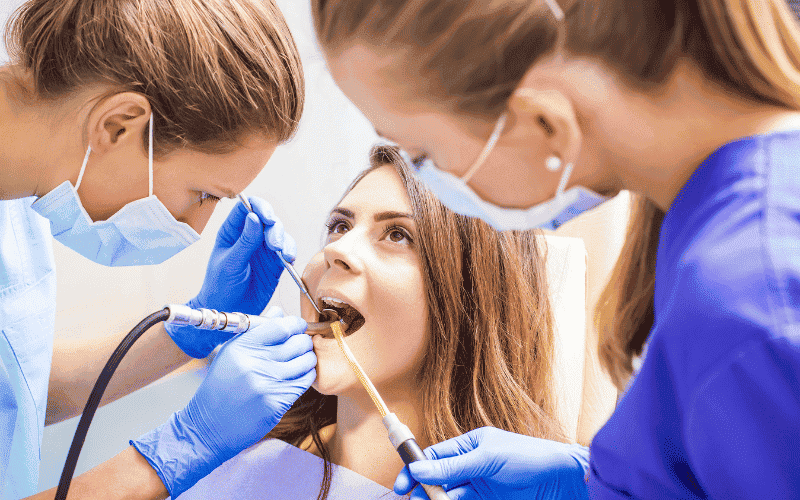Dental trauma, unfortunately, is a common occurrence that can happen to anyone, from young children to adults. Whether it’s a sports injury, a fall, or an accident, the impact can be significant. Quick and appropriate action is crucial in preserving your oral health. Being aware of all the types of dental trauma, such as chipped or fractured teeth, knocked-out teeth, and soft tissue injuries, can help you respond effectively.
Immediate steps like safely preserving a knocked-out tooth, managing pain and swelling, and seeking professional dental care are essential to minimize damage and ensure the best possible outcome. In this guide, we’ll explore the different forms of dental trauma, the steps to take immediately after an injury, and the available treatments to help preserve the best possible oral health and regain your smile.
About Dental Trauma
Any damage to the teeth or gums is referred to as dental trauma. The injury’s severity might range from slight chips and cracks to complete tooth loss. Timely intervention is necessary to stop more complications and save the affected tooth, if possible.
Common Types of Dental Trauma
- Avulsion: The entire tooth is removed from its socket.
- Intrusion: A tooth is forced inward into the bone.
- Extrusion: A tooth is pushed partially or completely out of its socket.
- Fracture: A tooth is chipped, cracked, or broken.
- Luxation: A tooth is loosened in its socket but remains in place.
- Concussion: Injury to the tooth’s supporting structures without visible damage.
Immediate Care for Dental Trauma
Time is of the essence when dealing with dental trauma. Here are some general guidelines for immediate care:
- Stay calm and assess the situation.
- Use a clean cloth and light pressure to stop the bleeding.
- Handle a knocked-out tooth by its crown rather than its root.
- Wash the tooth gently with water, but do not scrub it.
- If possible, reinsert the tooth into its socket, being careful not to force it.
- If you cannot reinsert the tooth, keep it in a container with milk or saline solution.
- Apply a cold compress to reduce swelling.
- Seek emergency dental care in Airdrie as soon as possible.
The Importance of Emergency Dental Care
When faced with dental trauma, seeking immediate treatment is crucial. Dental professionals who specialize in emergency care can help you reach your smile goals faster. By visiting a dentist promptly, you can raise the likelihood of preserving a broken tooth and preventing further complications.
Treatment Options for Dental Trauma
The treatment for dental trauma will depend on the type and severity of the injury. Common treatment options include:
- Splinting: Stabilizing loose or fractured teeth.
- Root canal therapy: Treating a tooth with damaged pulp.
- Crown placement: Restoring a severely chipped or cracked tooth.
- Dental implants: Replacing a completely lost tooth.
- Orthodontic treatment: Correcting misaligned teeth caused by trauma.
Every dental trauma case is unique. It’s necessary to visit a qualified dentist to determine the best course of action.
Prevention of Dental Trauma
While accidents can happen, there are steps you can take to reduce the risk of dental trauma:
- Wear a mouthguard during sports activities.
- Use caution when chewing hard objects.
- Practice good oral hygiene to maintain strong teeth and gums.
- Regular dental check-ups can help identify potential problems early on.
Long-Term Care After Dental Trauma
While immediate care is crucial in dental trauma, long-term follow-up is equally important to prevent complications and ensure optimal oral health. The severity of the injury will determine the extent of the necessary care.
Potential Long-Term Effects of Dental Trauma
Tooth discoloration: Internal bleeding or nerve damage can cause teeth to darken over time.
Root resorption: In some cases, the tooth’s root can gradually dissolve.
Infection: If the tooth’s pulp is exposed, it can become infected.
Tooth loss: Severe trauma may result in the permanent loss of a tooth.
In the end, they can be a distressing experience, but with prompt and appropriate care, the outcome can be positive. If you or someone you know experiences a dental injury, don’t hesitate to seek emergency dental care in Airdrie. By acting quickly, you can protect your smile and prevent long-term complications.
The first moments following a dental injury are crucial. Preserve any dislodged teeth or fragments, manage pain and swelling, and get professional help as soon as possible. With the right care, you can ensure a swift recovery and maintain your oral health for years to come. Don’t let a dental emergency compromise your smile—reach out to your local dental professionals in Airdrie for the care you need.

